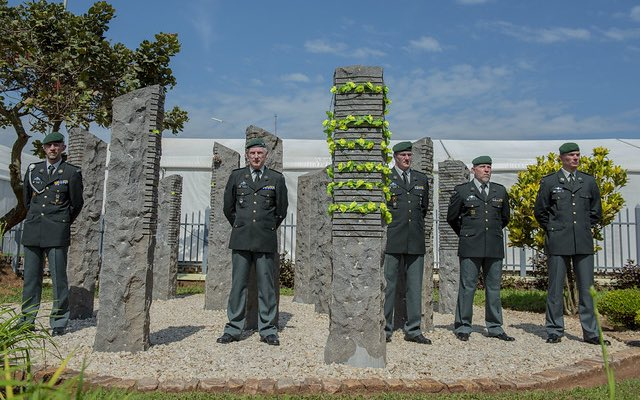
In a solemn and moving ceremony, Rwandan and Belgian dignitaries have paid their respect to the ten Belgian UN peacekeepers who were killed at Camp Kigali on the first day of the 1994 Genocide against the Tutsi. The ceremony was preceded by a commemoration at the Embassy of Belgium in Kigali for the Belgian nationals and Rwandan employees of the embasy who lost their lives during the Genocide.
The commemoration at Camp Kigali was attended by the ministers of Defence of Rwanda and Belgium, the Belgian minister of Foreign Affairs, the president of the European Council, high-ranking officials of the RDF and the Belgian Army, members of the diplomatic corps and family members of the victims.
At this 30th edition of the commemoration, there was a notable presence of the family members of the 10 paracommandos of the 2nd battalion based in Flawinne, Belgium. They travelled to Kigali as part of a large military and civil Belgian delegation that on 7 April took part in the national commemoration ceremonies for the 1994 Genocide against the Tutsi in Rwanda. Also present were 4 classes of Belgian schoolchildren with their teachers.
In 1994, the Belgian soldiers were in Kigali as part of the UNAMIR Peacekeeping mission. In the early hours of 7 April, they received the order to escort the then Prime Minister Agathe Uwilingiyimana to the National Radio to address the population in an attempt to stop the ongoing targeted killings. On arrival at her house, they were confronted by soldiers of the presidential guard and forced to hand in their weapons, with the promise to be safely escorted back to a UN coumpound.
Instead, they were transferred to the Camp Kigali barracks and almost immediately attacked by an angry mob of soldiers of the forces armées rwandaises. After hours of valiant resistance, waiting for help from the UNAMIR leadership that never came, they took a last stand inside a school classroom but were finished off with grenades by noontime on 7 April.
The 10 Belgian soldiers are remembered for their courage and dedication in the fulfillment of their mission to protect the values of peace and democracy. Their ultimate sacrifice in the line of duty is a reminder to learn from the past and create a better future. The participation of a large delegation from Belgium is an occasion to show respect to the victims of the genocide against the Tutsi, the fallen soldiers and their loved ones.
In her speech, Belgian minister of Defence Ludivine Dedonder said: “April 7 will always be remembered in Belgium as the day we lost ten of our bravest soldiers. That is why the 7th of April is our national day of remembrance for all soldiers who lost their lives during active service. We will never forget their sacrifices for our country and for maintaining peace. We also commemorate the genocide against Tutsi here in Rwanda. We remember all the lives lost, in the hope that such acts will never be repeated.”
The commemoration at Camp Kigali was preceded by a more restriced ceremony at the Embassy of Belgium in Kigali for the families of the Belgian nationals and the Rwandan employees of the embassy who lost their lives during the Genocide. Also for this occasion, two families travelled from Belgium to Rwanda.
In her speech, Belgian minister of Foreign Affairs Hadja Lahbib said: “We should do more to make sure that such a tragedy can not happen again. The state of the world in 2024 leaves us no other choice. It is no longer enough to say “never again”, we should take our responsibilities and act to prevent it from happening again.”
The commemoration brings together Rwanda and Belgium in a joint commitment to build security through cooperation. Both the Belgian minister of Defence Dedonder and the Belgian minister of Foreign Affairs, Hadja Lahbib, are meeting their Rwandan counterparts, ministers Juvenal Marizamunda and Dr. Vincent Biruta, later on April 8 for a bilateral meeting. (End)
